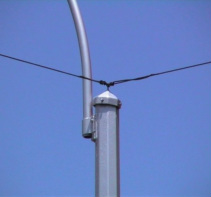
New to Cleveland, husband, three daughters and myself are in a rental house. Now, six months after our move, our search for a home to purchase begins. And it is filled with dilemmas.
Of course I am referring to the material dilemmas: How much space do we need, how money can we afford. Much heaver, though, is the immaterial, spiritual, existential question: Where do I belong?
Inside the eruv or not?
The eruv is a flimsy construction - in places just a wire - that wraps around an area and encloses it, creating a Jewish space for congregating, living close, shuttling kids, bringing bottles of wine for Shabbat lunch, carrying high-heels to change into, keeping tissues in the pocket, taking along house-keys, a book, a snack, a child’s favorite toy.
It is place for socializing, shul going, hosting and being hosted, where one day each week there is no TV, no cars, no technology. Most of all it is a place of pervasive connection and belonging; to family, friends, community, history, and - when I am very lucky – to the Divine.
And yet, I wonder, is this where I truly belong? Is this really my place? Me, with my doubts, questions, cynicism, anger, seeing through it all as a social construction created in the name of God.
Perhaps I should muster my courage, call a spade a spade, and say it: I do not belong here, inside. My doubts are too heavy, my questions too loud, my belief too weak.
On the other side, just across the road from where the eruv boundary ends, I imagine a world unconstrained. A shadow of myself hovers there, waiting. Longing to escape the heavy burden of tradition, the crush of history and community that suffocates, holds me back from being someone else, a someone who is open, re-fashioned, unfettered and free.
And yet, that shadow of myself over there, in that world on the other side, is unmoored and adrift. Outside of the eruv, I am Eve, banished from the garden, sent out to wander and fend for myself, a rupture that may be too heavy to bear.
The eruv is my blanket, it is my circle, it is my home, it holds me tight and keeps me.
Of course I am referring to the material dilemmas: How much space do we need, how money can we afford. Much heaver, though, is the immaterial, spiritual, existential question: Where do I belong?
Inside the eruv or not?
The eruv is a flimsy construction - in places just a wire - that wraps around an area and encloses it, creating a Jewish space for congregating, living close, shuttling kids, bringing bottles of wine for Shabbat lunch, carrying high-heels to change into, keeping tissues in the pocket, taking along house-keys, a book, a snack, a child’s favorite toy.
It is place for socializing, shul going, hosting and being hosted, where one day each week there is no TV, no cars, no technology. Most of all it is a place of pervasive connection and belonging; to family, friends, community, history, and - when I am very lucky – to the Divine.
And yet, I wonder, is this where I truly belong? Is this really my place? Me, with my doubts, questions, cynicism, anger, seeing through it all as a social construction created in the name of God.
Perhaps I should muster my courage, call a spade a spade, and say it: I do not belong here, inside. My doubts are too heavy, my questions too loud, my belief too weak.
On the other side, just across the road from where the eruv boundary ends, I imagine a world unconstrained. A shadow of myself hovers there, waiting. Longing to escape the heavy burden of tradition, the crush of history and community that suffocates, holds me back from being someone else, a someone who is open, re-fashioned, unfettered and free.
And yet, that shadow of myself over there, in that world on the other side, is unmoored and adrift. Outside of the eruv, I am Eve, banished from the garden, sent out to wander and fend for myself, a rupture that may be too heavy to bear.
The eruv is my blanket, it is my circle, it is my home, it holds me tight and keeps me.
 RSS Feed
RSS Feed
